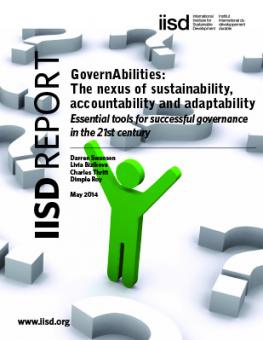
GovernAbilities: The nexus of sustainability, accountability and adaptability. Essential tools for successful governance in the 21st century
Governments today are challenged more than ever in three operational areas: pursuing sustainable development, being accountable to the public for the expenditure of taxpayer dollars, and anticipating and adapting to critical and cumulative risk.
Efforts within government to improve performance in these three core abilities of governance have been advancing largely independently over the past two decades, despite an apparent commonality in the basic principles and tools that drive them. The complexity and urgency of 21st century issues is an unforgiving place for uncoordinated efforts of such scale and importance.
This paper provides timely guidance to help governments at all levels improve their ability to effectively and efficiently pursue sustainability, accountability and adaptability. The common principles that underlie these governAbilities are highlighted along with a set of pragmatic tools that can be used to achieve them.
You might also be interested in
What Is the NAP Assessment at COP 29, and Why Does It Matter?
At the 29th UN Climate Change Conference (COP 29) in Baku, countries will assess their progress in formulating and implementing their National Adaptation Plans. IISD’s adaptation experts Orville Grey and Jeffrey Qi explain what that means, and what’s at stake.
IISD Annual Report 2023–2024
While IISD's reputation as a convenor, a trusted thought leader, and a go-to source on key issues within the sustainable development field is stronger than ever, the work happening outside the spotlight is just as valuable.
How to Make Nature-Based Solutions for Adaptation Work for Everyone
Effective nature-based solutions (NbS) for adaptation start with integrated climate risk assessments. These take-aways will help practitioners plan for inclusive and sustainable NbS.
Inclusive Nature-Based Solutions for Climate Adaptation
Discover how climate change and biodiversity loss impact people differently and how inclusive nature-based solutions for adaptation can help.